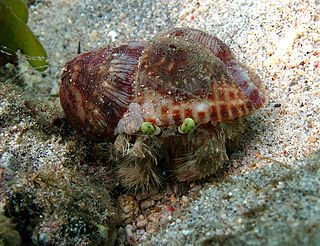
The dog whelk, dogwhelk, or Atlantic dogwinkle is a species of predatory sea snail, a carnivorous marine gastropod in the family Muricidae, the rock snails.

Whelks are any of several carnivorous sea snail species with a swirling, tapered shell. Many are eaten by humans, such as the common whelk of the North Atlantic. Most whelks belong to the family Buccinidae and are known as "true whelks." Others, such as the dog whelk, belong to several sea snail families that are not closely related.

The knobbed whelk is a species of very large predatory sea snail, or in the US, a whelk, a marine gastropod mollusk in the family Busyconidae, the busycon whelks.

Busycotypus canaliculatus, commonly known as the channeled whelk, is a very large predatory sea snail, a marine prosobranch gastropod, a busycon whelk, belonging to the family Busyconidae.

Rapana venosa, common name the veined rapa whelk or Asian rapa whelk, is a species of large predatory sea snail, a marine gastropod mollusc or whelk, in the family Muricidae, the rock shells.

Sea snail is a common name for slow-moving marine gastropod molluscs, usually with visible external shells, such as whelk or abalone. They share the taxonomic class Gastropoda with slugs, which are distinguished from snails primarily by the absence of a visible shell.

Sinistrofulgur perversum, the lightning whelk, is an edible species of very large predatory sea snail or whelk, a marine gastropod mollusc in the family Busyconidae, the busycon whelks. This species has a left-handed or sinistral shell. It eats mostly bivalves.

Buccinum undatum, the common whelk or the waved buccinum, is a large, edible marine gastropod in the family Buccinidae, the "true whelks".

Penion is a genus of large marine snails, commonly known as siphon whelks, classified within the mollusc family Austrosiphonidae, the true whelks.

Neptunea lyrata, also known by the common names New England Neptune, wrinkled whelk, ribbed Neptune, inflated whelk, lyre whelk or lyre Neptune, is a species of large sea snail, a marine gastropod mollusk in the family Buccinidae, and is the state shell of Massachusetts. This species consists of several subspecies.
Pyrulofusus is a genus of sea snails, marine gastropod mollusks in the family Buccinidae, the true whelks.

Volutopsius is a genus of sea snails, marine gastropod mollusks in the family Buccinidae, the true whelks.

Muricopsis deformis is a species of sea snail, a marine gastropod mollusk in the family Muricidae, the murex snails or rock snails.

Nucella lamellosa, commonly known as the frilled dogwinkle or wrinkled purple whelk, is a species of sea snail, a marine gastropod mollusk in the family Muricidae, the murex snails or rock snails. This species occurs in the eastern Pacific Ocean, its range extending in the intertidal zone from the Aleutian Islands southward to central California.

Kelletia kelletii, common name Kellet's whelk, is a species of large sea snail, a whelk, a marine gastropod mollusc in the family Buccinidae, the true whelks.

Buccinanops is a genus of sea snails, marine gastropod mollusks in the family Buccinanopsidae, the Nassa mud snails or dog whelks and the like.

Kelletia lischkei is a species of large sea snail, or whelk, a marine gastropod mollusc in the family Buccinidae, the true whelks.

Dardanus deformis is a species of nocturnal hermit crab that is found in the Indo-Pacific. Its common name is pale anemone hermit. The species is known to transfer sea anemones from one shell to another when it moves to a different shell. It can be kept in an aquarium.

Cremnoceramus is an extinct genus of fossil marine pteriomorphian bivalves that superficially resembled the related winged pearly oysters of the extant genus Pteria. They lived from the Turonian to the Maastrichtian of the Late Cretaceous.

Fulguropsis spirata, commonly known as pear whelk, is a species of sea snail, a marine gastropod mollusk in the family Busyconidae, the busycon whelks. The species is also occasionally referred to as the Gulf pear whelk to differentiate it from other Fulguropsis species which are also referred to as pear whelks. It is an edible mollusc found in areas from the Caribbean to the Western Gulf of Mexico. The species was previously thought to range through the entire Gulf of Mexico down the Florida Peninsula and as far north as North Carolina in the Atlantic. The species is generally not found East of the Mississippi Delta, and any Fulguropsis found Eastward from said delta are most likely of the species Fulguropsis pyruloides. As a result many records of F. pyruloides from the aforementioned regions are falsely labelled as F. spirata.



















